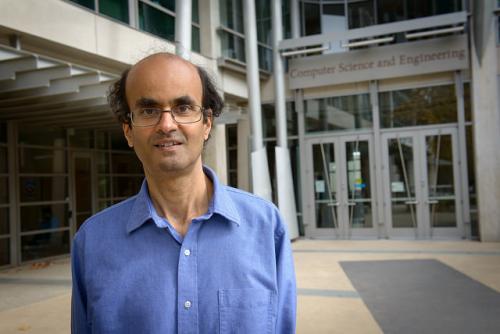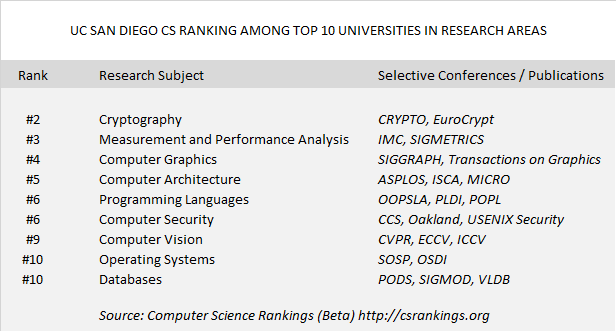
UC San Diego computer science is among the top-10 programs in the nation and the world, according to a new method for Computer Science Rankings that is still in beta testing. A team led by University of Massachusetts at Amherst professor Emery Berger recently unveiled the CSRankings for university computer-science programs, based on aggregate numbers compiled from faculty papers at top-rated conferences in each of 21 specialty areas (e.g., artificial intelligence, programming languages, etc.). Whereas US News and World Report rankings are based on surveys, "this ranking is entirely metric-based," says Berger. "It measures the number of publications by faculty that have appeared at the most selective conferences in each area of computer science."
 Based on average annual publications between 2000 and 2016, UC San Diego ranks #9 in the U.S. and worldwide (though only universities in Europe, Canada and the U.S. are tallied in the international total). The only University of California campus to outperform UC San Diego is UC Berkeley at #4. The top three programs in the overall CSRankings are Carnegie Mellon, MIT and Stanford.
Based on average annual publications between 2000 and 2016, UC San Diego ranks #9 in the U.S. and worldwide (though only universities in Europe, Canada and the U.S. are tallied in the international total). The only University of California campus to outperform UC San Diego is UC Berkeley at #4. The top three programs in the overall CSRankings are Carnegie Mellon, MIT and Stanford.
The rankings point to stellar performance in certain areas. The highest-ranked subject area in CSE at UC San Diego is cryptography, with the group ranked #2 in the world. Professor Mihir Bellare (pictured at left) is the most prolific author of 37 papers presented at CRYPTO and Eurocrypt (the flagship conferences in cryptography). In the field of measurement and performance analysis, the CSE group ranks #3 in the U.S, led by Stefan Savage and Geoffrey Voelker with 23 publications between them. In the computer graphics category, UC San Diego ranks #4 nationally, largely on the strength of professor Ravi Ramamoorthi's 52 papers published in SIGGRAPH or in Transactions on Graphics. Ramamoorthi is listed as the most prolific faculty member overall, combining his graphics papers together with 16 papers in computer vision (in which UC San Diego is ranked #9 nationally).
Other top-10 groups in CSE include those In computer architecture, ranked #5, as well as programming languages and computer security, both ranked #6 in their respective categories (with 11 faculty co-authors on security-related papers led by Stefan Savage). Operating systems research at UC San Diego is #10 in that field, with professor YY Zhou accounting for half of all papers presented at the Symposium on Operating Systems Principles (SOSP) or the USENIX Symposium on Operating Systems Design and Implementation (OSDI). The databases group is also #10 among others in that category.
 Doing well but just out of the top-10 in their respective categories, CSE faculty in machine learning and data mining as well as logic and verification are each ranked at #11, and human-computer interaction at #12 (with Scott Klemmer the most prolific with 23 publications). Software engineering at UC San Diego ranks #13, and our faculty tied with Princeton at #14 for algorithms and complexity. UC San Diego is ranked #15 for computer networks, and #19 in mobile computing.
Doing well but just out of the top-10 in their respective categories, CSE faculty in machine learning and data mining as well as logic and verification are each ranked at #11, and human-computer interaction at #12 (with Scott Klemmer the most prolific with 23 publications). Software engineering at UC San Diego ranks #13, and our faculty tied with Princeton at #14 for algorithms and complexity. UC San Diego is ranked #15 for computer networks, and #19 in mobile computing.
It will be interesting to see how UC San Diego groups fare in future rankings. Currently at #20 in the field of robotics, CSE and other departments are hiring for the newly-announced Contextual Robotics Institute. The faculty director is outgoing Georgia Tech roboticist Henrik Christensen, who is joining the CSE faculty this fall, along with other new faculty in robotics. Within a couple of years, UC San Diego could start climbing the ladder into the top-10.
It's worth noting that only four UC San Diego groups are ranked outside of the top-20 universities in the remaining subject areas. These include web and information retrieval, high-performance computing, natural-language processing, and artificial intelligence.
Learn more about the Computer Science Rankings (beta) and methodology.

